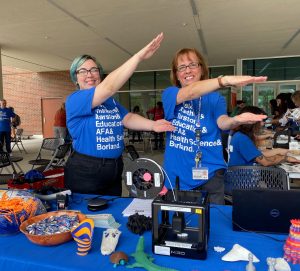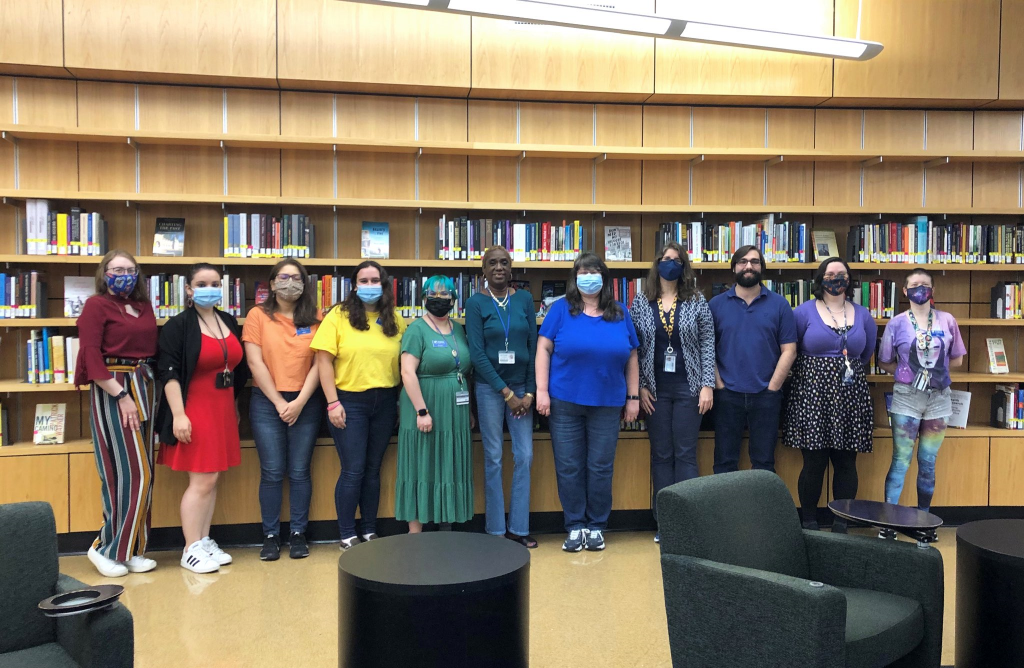Crash Course in Using the George A. Smathers Libraries
4 Get to Know the Library Experts
Libraries work because of library workers! There are so many folks who work in the libraries at UF who all play an important part — about three hundred full time faculty and staff, as well as another three hundred student assistants.
Service Desk Workers: The Friendliest Faces
The heart of the library is the service desk. When you visit each of the Libraries’ branches, the library experts at the service desks are here to welcome you into the building, assist with checking out items, and help with whatever you need.
At the desk, you can ask questions about everything library related! Whether that’s finding the call number for a book, using course reserves, learning how to print and scan, getting access to spaces like study rooms, checking your account for overdue items, and lots more.
Library workers at the service desk can also get you started with basic research questions for your classes. For in-depth research help, they might refer you to your subject librarian for an appointment.
Subject Librarians: Your Personal Research Helper

If you’re looking for a specialist for more specific guidance on resources for your classes, contact your subject librarian! They are experts in their field and can help you find information pertaining to your subject area.
In addition to pointing you toward relevant scholarly resources, subject librarians can also help with every part of your research process, from picking databases to clarifying citation styles for different disciplines to helping you brainstorm a topic for your paper.
Talking to your subject librarian is a great place to start your project or research. The best way to reach your subject librarian and set an appointment is through email.
When in doubt, contact your subject specialist librarian!
To learn more about what subject librarians can do for you and how to contact them, check out this tutorial video from the Libraries:
(Video above was created by the Libraries Information Literacy Committee. To see more, check out the Libraries Tutorials page.)
Behind-the-Scenes Workers: Keeping the Library Running
You will probably meet library staff at a service desk when you visit the building. You will (hopefully!) meet a librarian for research help. But you might not meet the all people working behind the scenes. Here is a little more information about what else is going on to keep the Libraries running.
Access and Resource Sharing: If you ever request an inter-library loan, these are the people who work with other libraries to get you what you need. This department also coordinates course reserves.
Access and Support Services: They make the library usable. At each branch, these library workers have duties such as working at the service desks, reshelving books, checking items in and out, operating reading rooms, opening/closing the building, and more. These workers are referred to as “Access Services,” “User Services,” “Public Services,” or “Academic Support Services” depending on the library branch.
Acquisitions and Collections Services: This department works with publishers and librarians to negotiate, purchase, and ensure access to all the stuff in the Libraries, both electronic and physical.
Administration: Departments like human resources, grants management, and payroll services work internally in the Libraries. Communications and Exhibits share information and cool materials with the public.
Assessment: They collect and analyze data about the Libraries’ services, collections, and physical spaces. They make recommendations about how to improve what the Libraries offer students.
Conservation and Preservation: This group has experts in maintaining and repairing rare materials to keep them intact. They also work on conditions like temperature and humidity in the storage buildings themselves to keep items safe.
Digital Partnerships and Strategies: This department works on initiatives like improving textbook affordability, promoting open access, and publishing books (like this one!). They also work with international partners on large projects.
Digital Support Services: Workers in this department add new materials to the digital collection and digitize existing print ones. If you write an undergraduate thesis, you can send it to them to save permanently!
Facilities: Facilities workers keep the building clean and functional. Say thank you when you see these vital employees!
Library Technology Services: These are the IT workers who maintain the websites, software, and all tech aspects of using the Libraries, both for the library workers’ computers and the public facing ones.
Resource Description Services: What good is having a library if you can’t find anything in it? This group catalogs items in the Libraries and adds metadata so that we can search for what we want.

The service desk is the place where the magic happens. Check out items, ask questions about research, and get help with whatever you need from the friendly library workers at the main desk. Also called the “circulation desk.”
Check out (also called a “loan”) describes when you borrow materials from the library. UF undergraduate students can borrow most items for up to eight weeks.
A call number is the combination of letters and numbers that describes the subject of the item and where an item can be found in the library. On the shelves, books are arranged by call number. A call number is like an address to finding a book.
Course reserves are materials, such as textbooks and journal articles, available for use in specific courses at the request of your professors. Some items are available in print in the libraries and some are electronic materials online. Course reserves are a way for you to access course materials at no cost.
Study rooms are individual rooms that groups of students can use for study sessions and team projects. Most of the study rooms in the Libraries can be reserved online.
A subject librarian (or "subject/area specialist") is a librarian who has expertise in a particular subject, discipline, or topic. Every major at UF has a subject librarian who is uniquely qualified to help them with their research.
Scholarly sources are written by experts in their research field for an audience of fellow researchers. These most commonly include journal articles and academic books. Oftentimes, professors are specifically referring to “peer-reviewed sources” when they mention “scholarly sources.”
Scholarly databases are used to search for and locate specific journal articles, book chapters, newspaper articles, and more. There are many databases available through the Libraries, and many of them are especially tailored to different majors. Unlike Google or Google Scholar, databases have powerful filtering tools to narrow down your search.
A citation is a reference to a book, newspaper, journal article, or other work containing the information a reader needs to locate that work. A citation to a book, for example, includes information like the author's name, book title, publishing company, place of publication, and date of publication.
Inter-library loan (ILL) is a service (at no additional cost to students) that allows you to borrow materials from other libraries through your own library. If the UF Libraries doesn’t have something you want to read, we will help you get it through ILL.
Open access resources (such as this guide) are available online to read free of cost to the public. Some journal articles, entire journal issues, and academic books are open access. To publish research open access, authors might be charged a fee.
A library catalog (much like a clothes catalog) is the log of all items (books, journals, DVDs, etc.) that the library owns or has access to.
Metadata are information that allows someone to identify, locate, and retrieve a resource. Metadata are what make items in the library searchable and findable.

